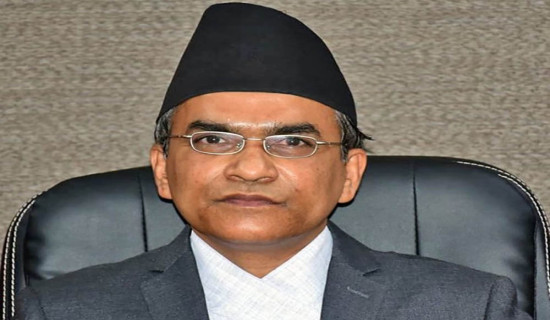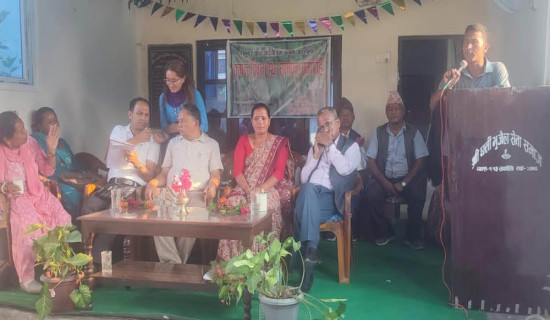- Tuesday, 10 June 2025
Sense Of Gratitude Fosters Inner Peace
Gratitude involves a humble response to what one gains from others. It is an old culture of Nepal to shower warmth and concern to others, especially the helpless ones. Many rural and uneducated men and women express gratitude through warm smiles and bless those who help them. Those acculturated in modern life in Nepal express the polite word anugrihitta or kritagyata. It backs the deepest feeling of thankfulness, dhanyabad in local phrases and even bowing down their heads in deep respect.
Everyone searching for a good life knows the delight of gratitude radiated from modest and giving persons. It harmonises our inner self, mental and physical condition and keeps in check the crude human nature of self-superiority and arrogance. Restoring the normative order of society can spike its resilience and build a culture of give and take. It sets society in fair balance. The expression of indebtedness helps to foster the peaceful virtues and basic human values of Nepali society, which are crucial to cultivating proper moral patterns for unruffled social ties.
Intrinsic social nature
Those who express gratitude find a condition of richness in self and with what they already have rather than what they lack. Alienation and anger spawn separation of human beings from their intrinsic social nature and a sense of humbleness. It erodes the source of their compassion for others, realising humanitarian value and stokes social anxiety, thus relapsing individuals to greed, jealousy, and self-centred mentality. Nepalis can improve the integrity and efficiency of individual purpose without undermining social good by developing the ability, skill, and virtue of gratitude in public life. The shift of Nepal from duty to rights-based culture and spiritualism to materialism has undermined the moral value of appreciation.
An apology for wrongdoing can also be taken as a sense of gratitude. It is not the virtues of the meek. Still, those imbued with intellectual, wealth and power arrogance animate a lack of gratitude. Persons of humility know both fine human gifts and deep flaws as well. An aptitude of appreciation is the positive nature of gratitude. It espouses gratefulness for one's own life, to others and generates an intrinsic feeling of psychic merit. Those who can express gratitude focus on enhancing their human feeling, sentiment, and acumen and widen the spot of affinity, emotion, affection and intimacy. Paropakar (giving to others), sharing and caring add new drive to socialisation about the wider world of the public.
It nurtures cooperative action by extending the associational sphere, such as satsang of Hindus and sangah of Buddhists. They consistently keep in assistance with this service and facilitate others, placing human value above other values such as power, authority, rank, position, wealth, etc. It psychologically, culturally, and socially elevates living standards, social competence, and opportunity for participation, representation and voice of the silent Nepali mass. Once we help the people, they reciprocate us at some point when we are thankful to them. This Hindu-Buddhist concept of compassion possesses the power of gratitude and recognises divine human nature. The continuity of this intrinsic divinity yields cooperation and enduring impulse for trust and social peace.
Here, ethical life seeks a balance between self-interest and care for others. Besides, it can shape decent behaviour for the formation of culture to bind selfish individuals to a common vision. Adaptability with nature is vital to steer life to a sustainable order of progress. Classical Nepali wisdom expresses gratitude to nature for clean air, water, light, energy, a variety of foods, etc. This value creates the moral balance of human beings with nature. This is the reason the enlightened Buddha favoured a mindful society to achieve durable social order and peace.
We should be thankful to plants, animals, birds, insects and microorganisms for elevating our life’s possibilities by performing many interdependent functions. Gratitude to the natural environment prompts us to bring life into harmony with the ethics of equity and sustainability. The corresponding policy of sustainable development prevents ecological degradation of public duties. As highly conscious creatures, human beings have to take into account the imperatives of other species because their physical survival depends on their regeneration.
In this sense, a sense of gratitude is essential to self-renewal and self-correction. We would not be alive if we did not respect each other’s virtues and lift each other’s worth. The ruin of this link can spoil the balance of society based on mutual respect. Gratitude is a daily ritual of Nepali lives where they teach their children a culture of respecting each other to rebuild life and repair injured relationships ruined by the clash of egos and conflicts. Social researches have revealed that grateful people are better in their culture and relatively healthier than those who don’t hold its heritage.
Positive correlations
A positive correlation exists between gratitude and health. People who nurse greed and grievances are caught in an anxiety spiral. Those who do not nurse such attitudes unlock a healthy life. In a multicultural society like Nepal, various ways of expressing gratitude shape the bond of unity and affinity. The culture of gratitude needs to be enthused from family and radiated across larger spheres of society and humanity. It expands the civil coexistence of all Nepalis and their emotionally balanced well-being.
Supporting gratitude elevates patience by sustaining a liberal attitude towards the tolerance of diversity. The gratitude-based Nepali society can create community power in the state of serenity and universalise their dignity and opportunity, order, stability and prosperity. In this era of frenzy and rage, the cultivation of proper sentiments of sociability and equal respect for human dignity enhances the realisation of the deeper and serene value of gratitude that amounts to the redeeming of human life. It resolves the ironies between what individuals are and what they want to be, revealing the best in themselves and the beauty of their culture.
(Dahal holds an MA in Peace and Conflict from Otto-Von Guericke University, Germany.)









-original-thumb.jpg)





-original-thumb.jpg)